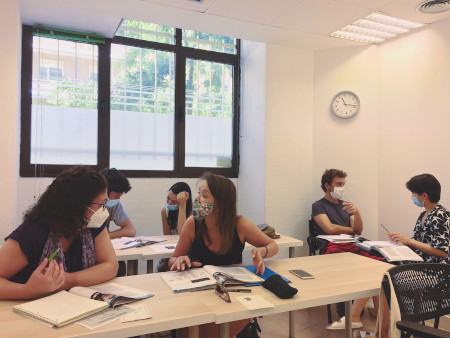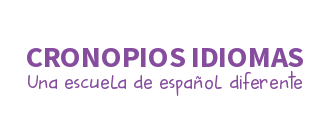How to learn Spanish effectively
Studying a new language can be hard: new words, new grammar and a new culture, all mingled into one language that you have to speak fluently and understand fast. You may think that this can be only achieved by locking up in your room and studying for a trillion hours, but there are ways to make the most of our studying, so that we learn Spanish and we never forget it. I’m a Spanish teacher at Cronopios Idiomas and here are some tips on how to learn Spanish effectively:
There is a reason for everything
First things first: why do you want to learn Spanish? Sometimes we are so focused on the ups and downs of studying the language that we forget to take the time to ask ourselves what our goal is. Is it for the pure pleasure of enjoying films in Spanish? Are you daydreaming about living in the Caribbean? Did you just get an awesome position in a company where Spanish is required? Learning a new language is like running on a track, and like any track, there is a start and a finish line. So before you hear the starting signal, visualise where you want to get, that way you will be able to lay out a plan, focusing on the things you really need and avoiding feeling frustrated with things that are not that essential. For instance, let’s say you will be traveling for a few weeks around the north of Spain -you might want to focus on the language you will use when asking for directions, eating out, booking an accommodation, etc..
Marie Kondo your Spanish
The KonMari Method™ consists of organising your things (and, therefore, your life) according to the category those things belong to. Clothes with clothes, books with books, and so on. Languages, like houses, include a wide variety of items that could fit in one category. The more specific, the better. In order to learn Spanish effectively, stop thinking of grammar like a huge pile of books with complex explanations and impossible examples and start looking for context: what structures do I need in a restaurant? In a classroom? In an office? Vocabulary can be infinite, instead of writing words, find connections between them. Even Spanish conjugations can get easier if you group them by type of irregularity (mentir, sentir or preferir share the same irregularity in the present tense –miento, siento and prefiero)
Reading is the new sexy
Get rid of endless lists of words, put on your favourite pair of glasses (in case you need them) and start turning pages! Books are a great source of new vocabulary, mostly delivered in full sentences that make it easier to understand the meaning of new words and when to use them. I know ‘reading books’ might sound a little bit old-fashioned, but the fact that nowadays there are a thousand ways to learn new vocabulary (ranging from apps to quizzes) shouldn’t mean that books are completely erased from our learning process. Being engaged with a story allows us to understand words that, in other circumstances, we wouldn’t be able to get as fast. Having said that, there is no need to be taking notes of every single word that we don’t fully understand. Learning a language is also admitting that we won’t always be able to get absolutely everything, and that’s ok. Getting the general idea of a sentence without looking up every word is also a way of achieving communication skills that will be invaluable under pressure.
Just do it
I know (I know) -subjunctive is pretty much the same as burning in hell. But as long as you commit to it, you will get it sooner than later. Being in a classroom, listening to the teacher and practising with your classmates is the first step. Most students believe that this is the most crucial part of learning Spanish effectively but that’s only the beginning. The truth is: our brain remembers better and faster our own experience than all of those lectures where we just listened. Take that sentence that took you half an hour and three questions to understand, make it your own and use it at the first chance.

Spanish classes at Cronopios Idiomas
Nobody’s perfect
Making mistakes is a marvellous way to feel ashamed. I mean, to learn. We tend to think poorly of ourselves when the words don’t come out the way we planned them, but there is nothing wrong with being wrong. Actually, it is only one more proof of our human condition. Keep in mind this is an extra effort that you are making to learn a language besides your own. You already speak fluently in your native tongue, there is no shame in making mistakes in a new one. We should start looking at mistakes as ways to spot a problematic structure and practise it. How to learn Spanish effectively: talk, talk, talk. You won’t be the first nor the last one to make mistakes and they will lead you to that sweet spot where all learners want to get: the finish line.




Leave a Reply
Want to join the discussion?Feel free to contribute!